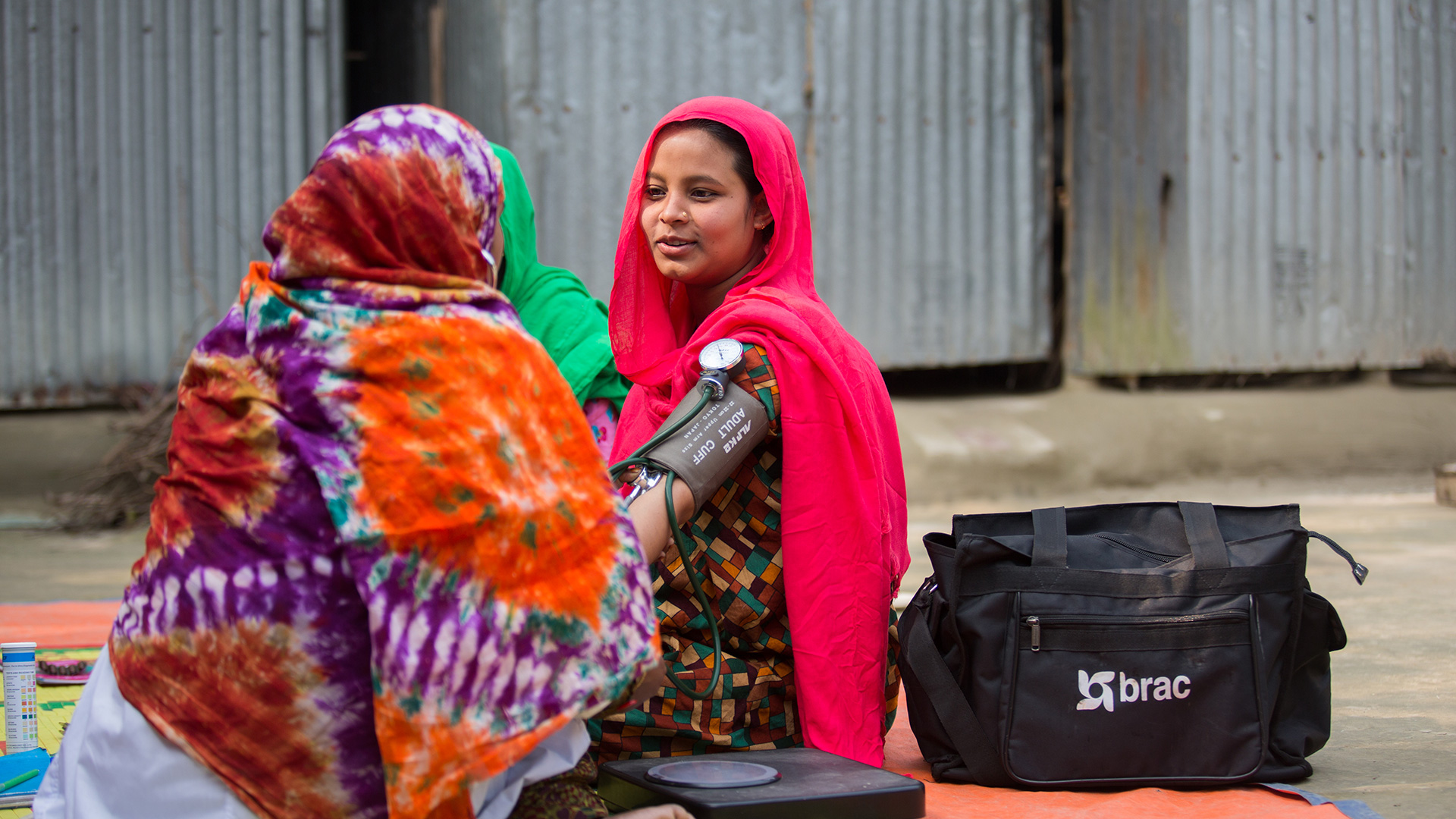HEALTH, NUTRITION AND POPULATION
Non-communicable diseases account for 59% of deaths in Bangladesh. 80% of maternal deaths are preventable. One-third of children under 5 are stunted. Out-of-pocket health expenditure pushes 5.1 million people into poverty annually.
We take health and nutrition awareness to the doorsteps of 110 million people through 60,570 community health workers and volunteers across the country. Our approach ensures continuum of care through community, facility, referral, and tech-based services.
Our integrated services ensure reproductive, maternal and child wellbeing, primary healthcare, disability care, and treatment of communicable and noncommunicable diseases for the most marginalised communities.
We collaborate with the community, government, and private stakeholders to complement overall health system strengthening. Improving access, lifestyle, and health-seeking behaviour is the core of our work.
Provided maternity care to 1.5 million and nutrition counselling to 3.4 million pregnant women and mothers
Treated 1.3 million cases of diarrhoea and 1.2 million cases of pneumonia
Ensured specialised care and treatment for 220,387 persons with disabilities
Created access to affordable diagnosis in 4 districts through an enterprise model
WATER, SANITATION AND HYGIENE
44% of the country’s population still consumes drinking water with some form of contamination whereas only 34% has access to a sanitation facility that does not guarantee safe excreta management.
We work towards achieving SDG 6 by delivering services to enable access to safe drinking water and sanitation facilities in communities and schools, to people living in ultra poverty, in hard-to-reach, climateaffected, and underserved urban areas, including the Rohingya camps and host communities in Cox’s Bazar.
Our approach is multidimensional, from encouraging positive behaviour changes through our work in schools and communities, promoting hygiene and menstrual hygiene awareness, solid waste and fecal sludge management, and financing WASH markets to support water and sanitation entrepreneurs and clients.
69 reverse osmosis-based water treatment plants developed
158,836 people accessed safe drinking water
263,450 people accessed improved hygienic latrines
610 WASH entrepreneurs supported
Introduced WASH financing with Microfinance and grants through UPG
COMMUNICABLE DISEASES
Bangladesh is one of the 30 top priority countries with a high burden of TB, with an estimated 27% missing cases. Malaria is endemic in 13 districts.
We work in collaboration with the government, and in partnership with other NGOs, to attain the SDG goals for TB and Malaria by 2030. We also offer HIV infection screening to tuberculosis patients and other high risk population groups through counselling.
We follow a holistic, patient-centered approach incorporating prevention, diagnosis, treatment, and follow up services across Bangladesh and in the Rohingya camps. The services are provided through a diversified partnership with public, private, and corporate sector healthcare providers.
1.57 million presumptive TB cases tested and 193,424 people diagnosed
95.9% TB cases successfully treated
483,043 people tested for malaria and 6,753 cases diagnosed and treated successfully
BRAC alone detected over 60% of total TB and malaria cases in Bangladesh
4,888 people including TB patients and other high-risk groups screened for HIV

THE WOMEN ON THE FRONTLINE KEEPING COMMUNITIES HEALTHY
A group of women sit in the verandah belonging to Nurunnahar Begum, a community health worker, known in her village as the shasthya shebika. One of the women complains about persistent heavy breathing and coughing. She is wondering if it is asthma, like her relatives suggest.
Dressed in her recognisable vest, Nurunnahar advises the woman to take a TB test.
The community health worker model brings women to the frontline of health services, in the most urban and the most remote regions. The model recognises that women are key in overcoming socio-cultural barriers to access in healthcare services. At present there are 48,734 shasthya shebikas working across Bangladesh. All of them are women.
Nurunnahar’s community is well-informed about diseases and hygiene practices. Nurunahar joined the BRAC TB Control Programme 17 years ago in Manikganj, a district in Dhaka. Every day since then she has gone door-to-door to check up on those who need help, connecting suspected TB cases to testing centres.
TB patients come to Nurunnahar every day and have their medicine under her watch, so she can make sure that they complete the uneasy but necessary course of treatment. She receives an incentive each time a patient completes their treatment, duration of which usually ranges from 6-9 months.
She initially had a hard time convincing people that tuberculosis could be treated at home. After helping a few people, her method was slowly accepted. When asked how many patients she has today, Nurunnahar breaks into a smile and says, “Uncountable!”
The programme has provided Nurunnahar with an income. She sells medicines for various diseases at a slight mark-up. She sent her son to the University of Dhaka, and recently fixed her house.
Her lessons have also been valuable for the community. No longer do people here drink from ponds or spit in public places. The changes have been minor but noticeable.
“I am blessed and I hope to continue this work for as long as possible,” Nurunnahar says. Her community agrees in unison that she should. They admire her, how can they not?

